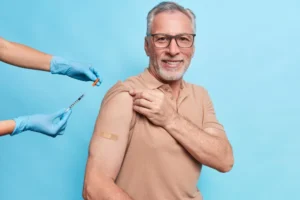 Immunization is a cornerstone of public health, offering protection against a wide range of infectious diseases that can cause severe illness, disability, and even death. While childhood immunization programs have been successful in reducing the burden of vaccine-preventable diseases. The importance of vaccination extends beyond childhood into adolescence and adulthood.
Immunization is a cornerstone of public health, offering protection against a wide range of infectious diseases that can cause severe illness, disability, and even death. While childhood immunization programs have been successful in reducing the burden of vaccine-preventable diseases. The importance of vaccination extends beyond childhood into adolescence and adulthood.
Adolescents and adults are susceptible to vaccine-preventable diseases and may also serve as reservoirs for transmission to vulnerable populations.
Today, we delve into the significance of immunization for adolescents and adults. Also, explore the rationale behind vaccination, recommended vaccines, and the role of immunization in promoting individual and community health.
Rationale for Adolescent and Adult Immunization
Immunization remains one of the most effective public health interventions for preventing infectious diseases and their associated complications. While childhood vaccination programs target specific age groups, adolescents and adults also require vaccination to maintain immunity against vaccine-preventable diseases and prevent outbreaks.
Vaccination not only protects individuals from illness but also contributes to herd immunity, reducing the overall transmission of infectious agents within communities and protecting those who are unable to be vaccinated due to medical reasons or age.
Recommended Vaccines for Adolescents and Adults
The Centers for Disease Control and Prevention (CDC) and the Advisory Committee on Immunization Practices (ACIP) recommend a range of vaccines for adolescents and adults based on age, health status, occupation, travel history, and other factors. Some common vaccines recommended for adolescents and adults include:
- Influenza (flu) vaccine. Recommended annually for everyone aged six months and older to protect against seasonal influenza viruses.
- Tdap vaccine. Protects against tetanus, diphtheria, and pertussis (whooping cough) and is recommended for adolescents and adults who have not received a Tdap vaccine previously.
- HPV vaccine. Prevents infection with human papillomavirus (HPV) strains that cause certain cancers and genital warts. Recommended for adolescents and young adults up to age 26.
- MMR vaccine. Protects against measles, mumps, and rubella and is recommended for adults who have not received two doses of MMR vaccine previously.
- Pneumococcal vaccine. Protects against infections caused by Streptococcus pneumoniae bacteria, including pneumonia, meningitis, and bloodstream infections. Recommended for adults aged 65 and older and younger adults with certain medical conditions.
Importance of Immunization for Community Health
Immunization not only benefits individuals but also plays a crucial role in protecting public health and preventing disease outbreaks. Achieving high vaccination coverage rates in adolescents and adults helps to establish herd immunity, reducing the overall transmission of vaccine-preventable diseases within communities. This is particularly important for vulnerable populations, such as infants, elderly individuals, and those with compromised immune systems, who may be at higher risk of severe complications from vaccine-preventable diseases.
Overcoming Barriers to Immunization
Despite the proven benefits of immunization, adolescents and adults may face barriers to vaccination, including lack of awareness, misconceptions about vaccine safety and efficacy, financial constraints, and limited access to healthcare services. Efforts to overcome these barriers include raising awareness about the importance of vaccination, improving vaccine accessibility, addressing vaccine hesitancy through education and communication, and integrating immunization services into routine healthcare delivery.
Immunization is a vital component of preventive healthcare for adolescents and adults, offering protection against a range of infectious diseases and contributing to individual and community health. By ensuring timely vaccination according to recommended schedules, adolescents and adults can safeguard their health and the health of those around them.
Healthcare providers, policymakers, and community stakeholders play crucial roles in promoting immunization uptake and addressing barriers to vaccination, ultimately working together to create healthier, more resilient communities.
Picture Credit: Freepik
